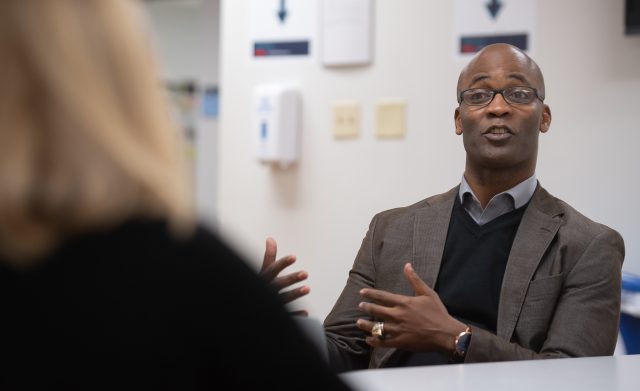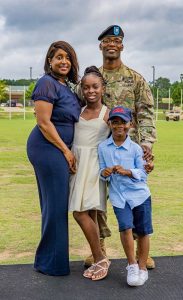
UM alumnus Lt. Col. Sheldon Morris talks with Annette Kluck, dean of the Graduate School, about his efforts to inform people about the benefits of COVID vaccination. Photo by Kevin Bain/Ole Miss Digital Imaging Services
OXFORD, Miss. – U.S. Army Lt. Col. Sheldon Morris returned to the University of Mississippi this week to meet with students, faculty and staff to answer their questions about getting the COVID-19 vaccine.
Morris is a former Ole Miss football player who served three tours in Iraq and Afghanistan. He was brought to campus by the Delta Health Alliance as an alumnus committed to helping provide guidance and information and answer questions about the vaccine in an effort to prevent major illness and deaths from COVID.
He is the military deputy director at the Center for the Army Profession and Leadership, at Fort Leavenworth, Kansas, where he is stationed.
“The big thing about this is I am not doing this from a military standpoint,” Morris said. “I am doing this as an Ole Miss graduate and an investor in people, and so that’s how I am approaching this, because I care a lot about this issue.”
The Rebels football team announced it was fully vaccinated heading into the football season. Morris, a native of Jacksonville, Florida who walked on to play wide receiver at Ole Miss from 1997 to ’99, said he is impressed with the leadership the team has shown on the issue.
“We have made some great strides here in the state,” Morris said. “Our football team was the first in the NCAA to have not only the football players, but the staff 100 percent vaccinated. It enabled our team the ability to go out and achieve the goals they have set for themselves. And we are doing very well.”
“We have lots of walking billboards around here for what it looks like to be vaccinated.”

Lt. Col. Sheldon Morris (counterclockwise from top right) spends time with his wife, Chelsea, and their children, Lauren and Dylan. Submitted photo
Misinformation has hampered efforts to tame the pandemic globally, and Morris hopes to direct those he encounters on campus to credible COVID-19 information sources, such as the U.S. Centers for Disease Control and Prevention, the Mississippi Department of Health, Johns Hopkins University’s global snapshot of COVID infections, and https://www.getyourshotms.org/, among other sources.
“My biggest part is to listen and then from listening to their concerns, I want to point them to the right direction to get the information that may help them in their informed decision,” Morris said. “From there, I want to connect them to the resources here at the university or in the surrounding cities.
“It is my feeling that once they understand where to get the information, they will make an informed decision.”
UM Provost Noel Wilkin met with Morris during his visit to campus, and said he appreciates the discussions that were held on such an important issue.
“It is great to have Lt. Col. Sheldon Morris back on campus to help people think through and discuss their concerns about the vaccines,” Wilkin said. “After all, this boils down to people choosing to get vaccinated; and his approach to considering the factors that concern people, and discussing the pros and cons, will help people make good decisions.”
Morris spent much of Thursday (Nov. 4) meeting with campus groups. The 2000 UM graduate, who was in Army ROTC as a student, quickly noted that he is fully vaccinated and is quick to tell others his status.
“My family, all of the ones who can, are fully vaccinated,” Morris said. “When I am out talking about this, I tell people this. I want them to know that my creed and my deed match.”
He believes having students and staff hear from their classmates and colleagues who have taken the vaccinations is useful.
“There are a lot of people on this campus who are vaccinated and having the (unvaccinated) students, faculty and staff engage with them to have that personal interaction is key,” Morris said. “It’s not someone you only see on TV or hear on the radio; it’s going to be someone you know or have a personal relationship with, and you have interacted with that person professionally or personally.”
The shot isn’t a cure, he points out, but it can greatly reduce the risk of illnesses and death among those infected with the virus.
Brent Marsh, UM dean of students, attended Morris’ meeting with a group of students, faculty and staff Thursday and said he believed Morris made a difference with his talk.
“The interaction with Lt. Col. Morris was very down-to-earth and relatable for audience members,” Marsh said. “When it comes to the vaccines, it’s important to dispel myths and point students to reliable sources of information, and Lt. Col. Morris did so very effectively.”
The university has a vaccination website with information about schedules and also coronavirus information to serve faculty, staff and students.